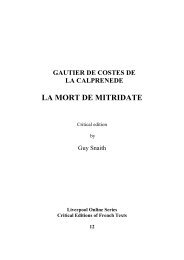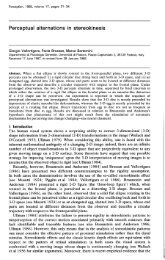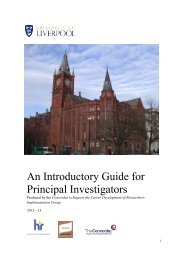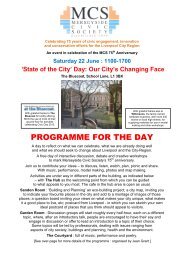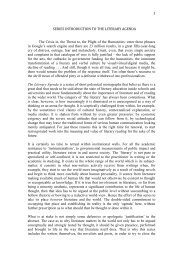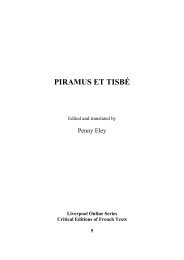LA MORT DE MITRIDATE - University of Liverpool
LA MORT DE MITRIDATE - University of Liverpool
LA MORT DE MITRIDATE - University of Liverpool
Create successful ePaper yourself
Turn your PDF publications into a flip-book with our unique Google optimized e-Paper software.
La Mort de Mitridate<br />
Bérénice<br />
Since the play hinges on attempts to persuade Pharnace to change his mind, La<br />
Calprenède obviously decided that a single scene with his father would not be<br />
powerful enough for that. With love also being such a powerful drawing card, he<br />
chose to provide Pharnace with a wife, thus doubling the appeals to Pharnace.<br />
With only a name borrowed from one <strong>of</strong> Mithradates’ concubines, La Calprenède<br />
created from nothing the most successful character in the play, the one who, he<br />
tells us, had audiences weeping, and who has fared best critically over the<br />
centuries. Comparisons with Corneille and Racine have been made, Bernardin<br />
seeing in her ‘une noble et pure création digne de figurer à côté de celles de<br />
Corneille’ (p.8), while Médan could declare: ‘ses incertitudes et ses douloureuses<br />
hésitations nous <strong>of</strong>fre comme l’ébauche inexpérimentée des âmes tourmentées et<br />
endolories dont Racine dévoilera sur la scène des angoisses’ (p. 63). Unlike the<br />
protagonist and antagonist, Bérénice is what she always was. Change is not in her<br />
nature.<br />
No character is thought <strong>of</strong> more highly than Bérénice. From Mitridate’s<br />
enthusiasm for her ‘glorieux exemple’ (I.3.269) to his tribute to her in death:<br />
‘Princesse vertueuse’ (V.2.1551), her vertu is universally acknowledged (ll. 266,<br />
690, 1505). Although married to Pharnace, her values are those <strong>of</strong> Mitridate and<br />
his wife and daughters, as proclaimed in any number <strong>of</strong> utterances: ‘J’estimois sa<br />
vertu, mais non pas sa couronne’ (I.3.250), chiastically echoing Hypsicratée’s<br />
earlier question to Mitridate: ‘Aimay-je vos grandeurs, ou bien vostre merite?’<br />
(I.2.213). An ideal <strong>of</strong> womanhood: beautiful physically, morally and spiritually,<br />
she is a French version <strong>of</strong> Goethe’s Ewig-weibliche, capable <strong>of</strong> inspiring man,<br />
drawing Mitridate out <strong>of</strong> despair, for example, and renewing his spirit. Were it not<br />
for the fact that she is also very human, her sévérité would class her alongside the<br />
heroines <strong>of</strong> La Calprenède’s novels. But Bérénice is humanized by the fact that,<br />
despite her principles, she still loves her husband. As firmly as she may proclaim:<br />
‘J’ay sur mes passions un absolu pouvoir’ (I.3.247), she can still confess to what<br />
she calls her ‘foiblesse’ (II.2.406), that <strong>of</strong> still loving Pharnace, ‘un mary qui [lui]<br />
estoit si cher’ (I.3.223). Her renunciation <strong>of</strong> him is thus all the greater.<br />
In the play’s central act, La Calprenède treats his audience to the first <strong>of</strong> the<br />
scènes à faire. Plunging in without any preliminaries, Bérénice lets Pharnace<br />
know how disappointed she is with him. Amazingly blunt, she sweeps aside all <strong>of</strong><br />
his attempts at excuses. Cold, indignant and angry, she ruthlessly cuts through his<br />
casuistry. Frank, sarcastic, dismissive and accusatory, she has Pharnace<br />
consistently on the defensive. And yet, she touchingly does still care for him and<br />
about his future and halfway through the scene changes tack. Worried about ‘le<br />
mal qui le menace’ (III.3.922) and fearing that he has set a course that will lead to<br />
his ‘prochaine ruine’ (l. 925), she says: ‘J’apprehende pour toy la vengeance<br />
divine: / Ceste peur, plus que tout, me faict venir icy’ (III.3.926-27). On her<br />
knees, in tears, she assures him: ‘Ton honneur seulement faict naistre tous mes<br />
vœux’ (l. 940). But, unable ultimately to move him, she turns her back on<br />
Pharnace and, walking back into the palace, she opts for death rather than a love<br />
34




